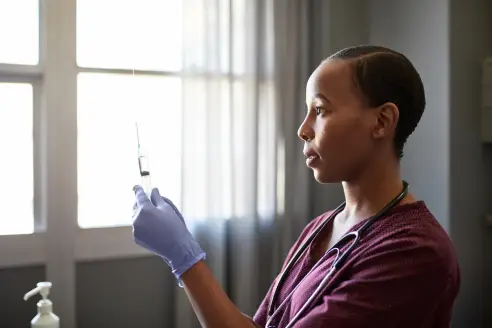
While preventing breast cancer with a single shot has long seemed far-fetched, that’s no longer the case. The latest research has now propelled multiple cancer vaccines into clinical trials—and while wide availability to the public is quite a few years away, these vaccines show promise for both preventing and treating some of the most devastating (and recurrent) types of breast cancer. Here’s what you need to know about how the vaccines work, who they’re for, and when they might be available.
What Is a Breast Cancer Vaccine?
A breast cancer vaccine is a vaccine that can protect you from developing breast cancer. “It would be preventive, like you get a vaccination for an infectious disease before you get the infectious disease,” says G. Thomas Budd, M.D., an oncologist and researcher at the Cleveland Clinic in Cleveland, OH. Meaning, “your immune system is primed to recognize [the breast cancer]—so when it happens, it can act.”
Some of the breast cancer vaccines being studied also seem to be beneficial if given after you already develop breast cancer, amplifying the efficacy of more traditional cancer treatments like chemotherapy.
Types of Breast Cancer Vaccines
The current breast cancer vaccines that are in the works, which spotlight two major subtypes of breast cancer (triple-negative and HER2 positive), work by telling the immune system that cancer cells are harmful before they even develop. (That said, these two types of vaccines are by no means an exhaustive list; there are 15 vaccines in various stages of clinical trials in the US at the moment.)
Current Research on Breast Cancer Vaccines
While the research is still in the early stages, a Florida woman, Lee Mercker, is now cancer-free after being the first to receive the vaccine in a clinical trial. Mercker was diagnosed with an early form of breast cancer called ductal carcinoma in situ (DCIS) stage 0 in March 2019 and jumped at the chance to participate in the vaccine trial.
Mercker received a shot of the vaccine in a series over 12 weeks. The vaccine mobilized her immune system against the cancer cells and her tumor shrunk. Because the vaccine is still in the trail phases, she also had a double mastectomy (surgical removal of both breasts) to ensure she was cancer-free.
This is just one of several vaccines the Mayo Clinic (and other institutions) are working on to help prevent and treat breast cancer.
“I think all breast cancer subtypes are good candidates for different reasons,” says Nora Disis, M.D., an oncologist and researcher at the University of Washington in Seattle, WA. Triple-negative breast cancer and HER2 positive breast cancer are just a couple of other types with experimental vaccines currently being researched. Learn more here:
Alpha-lactalbumin Vaccine
Intended for triple-negative breast cancer—which has a 65% survival rate over five years, accounts for up to 17% of breast cancers, and is disproportionately found in Black women—this vaccine hinges on alpha lactalbumin, which is a so-called “retired” protein. A retired protein is “produced only in specific tissues at a specific period in time, but not otherwise in the body,” says Dr. Budd, who’s also the principal investigator for the current clinical trial of the vaccine; alpha-lactalbumin is only found in the body during lactation, since it’s a key component of breast milk.
“As it happens, this protein is also produced by some breast cancers—predominantly, but not exclusively, triple-negative breast cancers,” he says. “The idea is that if someone is past the age of childbearing, breastfeeding, and lactation, we could immunize them against this protein, and the immune system then would attack the cancer cells that make too much of this protein.” The concept originated with the late Vincent Tuohy, Ph.D., the primary inventor of the vaccine and staff immunologist at Cleveland Clinic’s Lerner Research Institute in Cleveland, OH.
Sign up for our monthly Breast Cancer Newsletter.
Your privacy is important to us.
Age seems like it could be a limiting factor here, since the vaccine could only be given to those who don’t plan to have children. But among high-risk patients, like those who have the BRCA-1 mutation, it’s a concern they already deal with, since they typically need to have preventative mastectomies and oophorectomies (in which the ovaries are removed). In these cases, “they usually wait until they’re past childbearing—so it’s the same timeframe we’re already using in that group of patients,” Dr. Budd says.
HER2 Vaccines
These experimental vaccines target a key protein generated by certain breast cancer tumors. HER2 (short for human epidermal growth factor receptor 2) is found on many cells, and it appears in up to 30% of breast cancers. Not only are these cancers more aggressive, but they’re also more likely to recur after the initial treatment.
The concept of a HER2 vaccine for people with HER2-positive breast cancer stems from the idea of using the body’s immune system to recognize and attack cancer cells that overexpress the HER2 protein. “[HER2] vaccines allow the patient’s own cells to make HER2 over a short period of time, so it can be presented to the immune system the way the patient’s own genetics dictate,” says Dr. Disis, who developed a version of this vaccine alongside her colleagues. “It is a more effective method than injecting protein or protein fragments.” A 2022 clinical trial led by Dr. Disis found that the vaccine generated lasting immunity in most people.
The DC1 (Dendritic Cell Vaccine 1) vaccine is another HER2 vaccine currently undergoing clinical trials. Dendritic cells play a crucial role in the immune system by presenting antigens to T cells, thereby initiating an immune response. The goal of DC1-based vaccines is often to enhance the immune response against cancer cells, including those overexpressing HER2.
When Will Breast Cancer Vaccines Be Available?
Right now, these breast cancer vaccines are in the testing phase—but there’s a bright future ahead. “There are now advanced stage clinical trials of the HER2 vaccine,” says Dr. Disis. “It could be available to patients within the next eight years if the trials continue to show clinical efficacy.”
Dr. Budd estimates that some of these vaccines won’t be available until a decade from now or longer. “We have to go through a lot of steps to show that it works, and if we’re going to show that it reduces the chance of getting breast cancer, then it’s going to take years,” he says. “So, it’s a long road, but the sooner we start, the further along we’ll be.”
How Do Breast Cancer Vaccines Work?
Since many breast cancers have links to the immune system, breast cancer vaccines work by teaming up with the body’s immune system to target proteins associated with or expressed by breast cancer cells.
For instance, as Dr. Disis puts it, triple-negative breast cancers are inherently more immunogenic—meaning they trigger an immune response in the body—while HER2 positive disease is associated with a mutation (HER2) that is a strong antigen, which means it sets off a strong immune reaction in the body. And “hormone receptor-positive disease is thought to be the least immunogenic breast cancer, yet expresses many tumor antigens,” she says.
By either being immunogenic or expressing antigens, breast cancer can elicit a type of immune response that makes them good targets for vaccines, says Dr. Disis.
Protein vaccines, like the alpha-lactalbumin vaccine, work by introducing a protein to the immune system, while DNA vaccines, like that for HER2-positive breast cancers, use DNA encoding to mark the enemy.
These vaccines could be used both preventatively and after a diagnosis, in conjunction with traditional treatments. (More on that in a bit.)
Much of the current value of breast cancer vaccines is in reducing the rate of breast cancer recurrence. “Recurrence is a major clinical problem in breast cancer, but also provides a shorter time frame to assess to see if a cancer vaccine works. If you immunize patients at high risk of cancer recurrence, with an adequately powered study, you could get your answer of whether a vaccine protects against this in two to three years,” says Dr. Disis.
However, the ultimate goal is to show that a breast cancer vaccine “works” with a clinical effect, says Dr. Disis—that is, that it can prevent breast cancer entirely.
How Much Will Breast Cancer Vaccines Cost?
Right now, it’s too early to say how much breast cancer vaccines will cost, although it’s likely they’ll be covered by insurance for those who qualify, according to research published in Human Vaccines & Immunotherapeutics.
It appears it’ll be as affordable as any other vaccine available since it’s effectively “off the shelf” and doesn’t require much to administer. “I think they can be as affordable or even more so than the COVID vaccine,” says Dr. Disis. That can also make it more accessible than, say, immunotherapy, which comes at an especially high cost.
Breast Cancer Vaccine Vs. Other Breast Cancer Treatments
Breast cancer vaccines are not an either/or proposition, says Dr. Budd, but a matter of pairing them with other breast cancer treatment options. Realistically, a vaccine “would be used as a supplement to chemotherapy, surgery, and radiation, for prevention,” he adds.
Chemotherapy and vaccines may turn out to be a powerful combination. While the previous understanding was that chemotherapy had a negative impact on the immune system, “in recent years we have come to understand that some chemotherapies actually help the immune system work better—especially the type of chemotherapies that are used for breast cancer,” says Dr. Disis. On top of that, vaccines can create T-cells that contain cytokines, or immune system proteins, that help “hold the tumor growth at bay and make chemotherapy more effective,” she says.
Dr. Budd’s hope is that the vaccines can also help patients avoid surgery entirely. “If we can show that it works, it would mean that women would not have to undergo the prophylactic bilateral mastectomy, which is a big operation,” he says.
The Future of Breast Cancer Vaccines
Right now, many vaccines are in the midst of phase one trials, which are for general safety of the vaccine. That means researchers are trying to figure out what dose to use and what to base the dosage on, like side effects and the immune response, says Dr. Budd. (The side effects so far have been injection site reactions, like inflammation and tenderness, he says.)
The good news for the time being? “Breast cancer vaccines are one of the fastest growing areas of breast cancer research,” says Dr. Disis. “The future is bright, and we will have vaccines for breast cancer being used as standard of care sooner rather than later."
More Like This
Is Fibroglandular Density Dangerous?
Medically Reviewed
9 Major Breast Cancer Myths Debunked
Medically Reviewed
What to Know About Breast Bruises and Cancer
Medically Reviewed
How Race and Ethnicity Affect Metastatic Breast Cancer Outcomes
Medically Reviewed